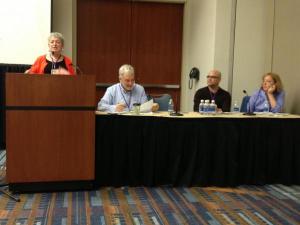By Melissa Pandika
Alan Brown, moderator of the panel, “Surviving your mid-career crisis,” faced a scary question as a feature writer when the demand for long-form began to dwindle: how would he make a living? He turned the panel over to three freelance writers who helped him through their own experiences wrestling with the same question. In the end, building on their existing knowledge and skills and forming relationships allowed them to pay the bills while still doing what they love.Adam Aston lost his job as a science and technology writer for BusinessWeek after Bloomberg purchased it in 2010. He stayed in the science writing business by building an online presence and making “a mental shift” in how he viewed his career. He slowly built up his LinkedIn, Facebook, and Twitter profiles, which continue to draw queries from potential clients. He’s also stopped strictly pursuing feature stories, instead forging relationships with outlets, like straight news websites, that don’t require him to invest the time and effort of pitching pieces that ultimately pay little.
Beth Schachter credits her success to her business savvy. “I don’t call myself a freelancer,” she said. “I am an independent business person.” A scientist-turned-writer, Beth Schachter hungered for more feature assignments after writing a feature article for Nature Biotechnology. But eventually she, too, realized that she couldn’t make a living off feature writing. Now, besides writing and editing for the biomedical community, she also offers workshops and coaching. A master of LinkedIn, she uses InMail to directly contact potential clients and sources, as well as LinkedIn groups to make business contacts. She’s also built leadership and meeting organization skills as a member of Toastmasters.
Cathy Dold seized every opportunity she encountered, leading her to find success in unexpected places. After getting laid off from Audubon Magzine, she wrote brochures and PowerPoint presentations for companies and physicians in addition to writing magazine features. Although she had never blogged or used Twitter before, she agreed to write and implement a social media plan for the American Society of Nephrology. After reading reports and talking to others, she drew up a plan to systematically attract students to the field. She then live tweeted the society’s conference and used Storify to write daily wrap-ups. Recently she agreed to co-author a book with a physician about addiction, called Recovery, which she hopes will launch her into the next phase of her career—writing books for doctors. Science writers can organize information and interpret science and have many different skills, said Dold. “So if someone gives you something, say, ‘Sure.’”
Instead of ending with the usual Q&A session, the workshop ended with audience members breaking into groups, each led by a panel member. Group members shared and received feedback about their mid-career struggles.
Even writers deciding whether they want to embark on a freelance career found the session valuable. Science News writer Tina Saey is considering freelancing full-time but the business aspect makes her hesitant. “It’s heartening to hear that people are making a living,” she said.

